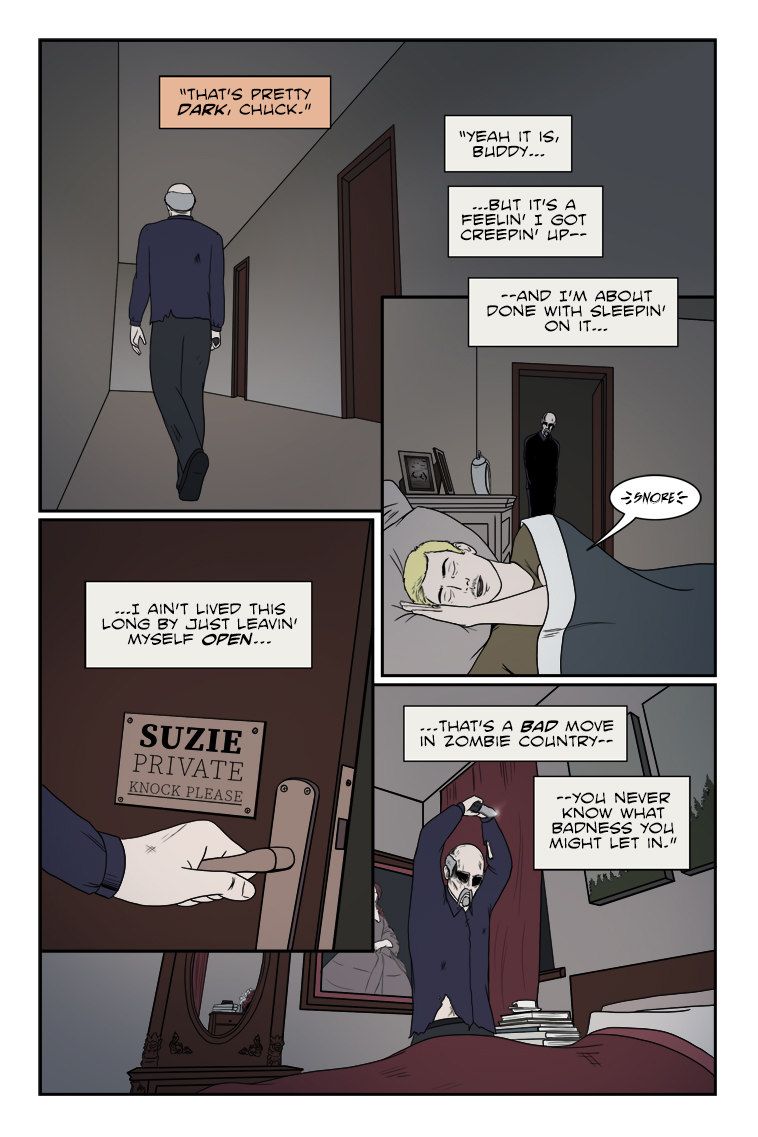Cart
Product categories
Support Us!
If you like what I do please support us on Ko-fi or Patreon.
Follow Us!
Join Our Newsletter!
Vote For Us!
Login
Polls
Events
-
Pasadena Comic Con
Dates: Jan 26
Location: Pasadena Convention Center, 300 E Green St, Pasadena, CA 91101, USA ( MAP)Details:We will be at the Pasadena Comic Con on January 26th. See some of you there for this one day event!
Purchase tickets online at here: https://www.tixr.com/groups/pcc/events/pasadenacomiccon-pasadena-comic-con-2025-115248









8 thoughts on “539 – A Knife In The Dark (END OF EPISODE 22)”
Keith
Why am I not surprised.
Scarsdale
Typical, it’s always someone else’s fault. Revenge is not just best served cold, but by stupid too. “This is all your fault!” Which is wrong, but in his head, it’s right.
steelraven
It’s also been heavily hinted he has already been brain washed by the zombie worshiping cult.
Scarsdale
Which, no doubt, made easier because of that under-lying feeling. People are always looking for a scape-goat…
Clint
I don’t know if you got my callback by intent or not, but it’s great to see almost the same words echoed! https://www.zombieranchcomic.com/comic/203-breaking-worst/
RC
Honestly, probably the first time he’s ever taken control of and done ever in his life. There’s a reason why they kept him. Give a dog that’s been beat all its life a whiff of conference and control, you got a problem.
Crazyman
Imagine his surprise when he stabs a pillow. 😜
Zombatar
He isn’t in control, RC – he’s probably drugged to the very dilated eyeballs, probably with Datura. Back on p.443, Eustace is shown holding a Mojave Rattlesnake on a stick while the Brujefe milks it into a glass. Mojave venom A is a paralytic neurotoxin, like tetrodotoxin. Tetrodotoxin was thought to be part of the legendary Haitian “zombie powder”. The other part was Datura, which contains scopalamine, which messes with memory and concentration, and is supposed to render victims docile and suggestible.
The question is, where did he get his current dose, and did a little drone whisper in his ear?
Latest Comics
#521. 500 – Rule Of Thumb
70 Oct 12, 2022
#520. 499 – Rhetorical Retrieval
69 Sep 14, 2022
#519. 498 – How Touching
53 Aug 24, 2022
#518. 497 – Sniff Check
52 Aug 10, 2022
#517. 496 – Saved By The Ble-e-gh!
53 Jun 22, 2022
#516. 495 – Deus Ex Caprica
50 Jun 01, 2022
#515. 494 – Once More With Chambering
49 May 18, 2022
#514. 493 – Gun Shy
50 May 04, 2022
#513. 492 – Darkness Crawls
58 Apr 27, 2022
#512. EPISODE TWENTY-ONE
67 Apr 25, 2022
#511. 491 – Surprised Mechanic (END OF EPISODE 20)
51 Mar 02, 2022
#510. 490 – Nope Problem
45 Feb 16, 2022
#509. 489 – Crappy Returns
46 Feb 02, 2022
#508. 488 – Bad Shape
43 Jan 19, 2022
#507. 487 – Got Beef?
50 Dec 15, 2021
#506. 486 – Get The Lede Out
50 Nov 24, 2021
#505. 485 – Proof Of Life
48 May 12, 2021
#504. 484 – Words Of Wisdom
45 Apr 28, 2021
#503. 483 – Solar Systems
48 Apr 21, 2021
#502. 482 – His Body His Business
42 Apr 14, 2021
Latest Chapters
Episode 22
Episode 21
Episode 20
Episode 19
Episode 18
Episode 17
539 – A Knife In The Dark (END OF EPISODE 22)
Happy Holidays, all! That's a wrap (heh) for Episode 22 just in time for a Christmas cliffhanger! Hope we don't twist the knife too much...
See y'all in 2025 when Zombie Ranch continues!
Dangerous slang…
Calendar
Writer’s Blog Archives